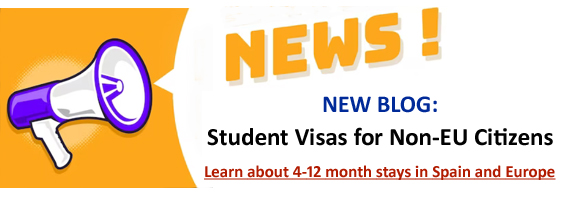LAST UPDATED: Abril, 2024. (Bear in mind that Cuba changes rapidly, so it is possible some things might be outdated soon.)
Cuba Practicalities – Are you traveling to Cuba for the first time? There is nothing quite like it! We have composed this list of practical help to avoid possible confusion and overwhelming. We suggest you read them all.
Americans traveling to Cuba
With the different American political tendencies and sometimes the administrations’ tension, Cuban and American relations can change rapidly from promising to unclear. For example, at the time of this writing the official category of People to People visits has been cancelled. However, there are still 12 categories which are accepted. If you are even ever asked by an American, stating one of the categories is enough. Here are the categories as stated in the US Embassy´s website:
The 12 categories of authorized travel to Cuba are: family visits; official business of the U.S. government, foreign governments, and certain intergovernmental organizations; journalistic activity; professional research and professional meetings; educational activities; religious activities; public performances, clinics, workshops, athletic and other competitions, and exhibitions; support for the Cuban people; humanitarian projects; activities of private foundations or research or educational institutes; exportation, importation, or transmission of information or informational materials; and certain authorized export transactions.
In order to avoid red-tape BEST Programs makes it simpler for our participants with US passports by recommending traveling through Mexico, Canada or any other third country like Panama.
The Cuban government allows Americans to visit their country and does not stamp your passport so the restrictions imposed by the US for BEST´s participants, being a Spanish company, can be circumvented.

Cuba Practicalities – Arrival and Departure
Be patient at the airport once you arrive since it might take a while to get your luggage. You should bring a bottle of water from the plane in case you get thirsty. You also must be patient at the passport control since they do not work fast. Have your accommodation´s address, online questionnaire, travel insurance and return ticket ready to show at the passport control in case they ask.
Notes:
1. Online form necessary for entering Cuba. In order to save time at the airport in Cuba we recommend filling out the form online.
2. 30 mins of free wifi is available at Jose Marti International Airport for passengers.
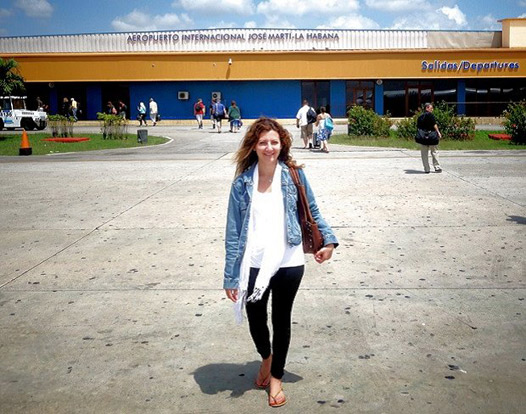
Cuba Practicalities – Mindset
Cuba is definitely not a country that should be visited if you are looking for comfort or a trip where everything runs like clockwork. It is a country for low-maintenance people. It has the advantages of a Caribbean island with the climate, scenery and wonderful beaches. The Cuban government sets most prices and rations goods.
Shopping
There are special shops that only sell with a foreign currency credit card but almost everything they sell can be bought elsewhere cheaper and easier. There are small private shops with snacks and some drinks and food, so if you see something you want to buy or need something, it is best to ask your tutor where to get it. Do not expect to find everything in one place, assuming you can find it anyway.
There are also fruit and vegetables markets. They are not very pretty but everything is organic. They also sell meat. The biggest one in the city is in Vedado neighborhood.
Change is occurring but progress is slow and while crime is not usually a problem, trickery can be, so watch your change
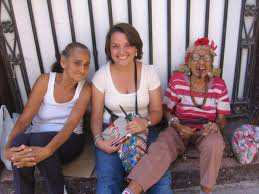
Why should you visit Cuba?
The appeal of Cuba is that is has remained free of western influence and commercialization. It is unique in this way. There are no advertising boards or fast food chains. There are few automobiles. The landscape is beautiful, the beaches ideal and most of the people are charming.
This program was set up from a non-political perspective to give you the opportunities for fun, to learn and for the chance to taste this particular moment in physical time and history. The colonial architecture, history, dance, language and music all add further to its appeal culminating in a unique experience which might be shocking or difficult at times, but which we guarantee you will never forget. Anyone visiting with an open mind, a sense of humor and an adventurous spirit will be more than rewarded by what they find.
Cuba Practicalities – Communications
Cell phone rates are not cheap in Cuba, but they have been decreasing little by little. We recommend that you use sms and data mainly to save money. If you stay in a home with a landline, it is free to call other landlines and to receive calls. In the packet described below 100 sms are included.
We recommend the package offered by Etecsa, the Cuban phone company. It is called CubacelTur and it is a temporary phone line with a 30-day life cycle as of its activation. It includes an initial basic package with SMS, minutes and data. You buy the pack before your arrival and pick up the sim card at the airport or one of Etecsa´s offices. It costs 35 USD. If you pick it up at arrival, it is at the Infotur stand in Concourse C of the José Martí International Airport, right after passing immigration. It is also possible to pick it up at any Etecsa Commercial Office in La Habana. The service at the airport is open 24/7

IMPORTANT: Your coordinator can also help you to obtain a local sim card. Your telephone must be freed and be able to accept sim cards. If one can find a Cuban to buy a local sim card, the price is lower. Sometimes the shops do not have any cards available and it might be necessary to check out another store, but most of the time they do.
It would also be possible to mix the two offers above.
Cuba Practicalities – Internet
There are many WiFi hotspots across the country. Every year, new hot spots pop up, Internet speed improves, and the cost of connecting decreases. In 2017, Google servers went live in Cuba, making them the first foreign internet company to host content in Cuba. You may not be able to jump on WiFi in every single cafe you visit, but know that Internet access has dramatically improved in recent years.
Cuban Internet Card
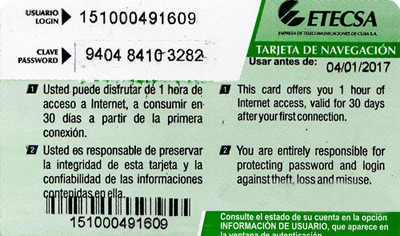
There is a public service of wifi Internet in the main plazas accessed by buying prepaid cards at the ETECSA offices known as Multiservicios and Telepuntos, where there may be one or more computers enabled as well. Sometimes they run out of cards, as previously stated above, even though the computers are working. In this case there is always the alternative of buying them from private parties or going to another shop. Ask your coordinator.
Unlike most countries, it’s not as simple as just connecting to an open network and entering the password. First, you need to buy the card (shown above) and then you can connect to the ETECSA wifi network. ETECSA is Cuba’s telecommunication company.

Once you turn on wifi, you’ll select the “ETECSA” network (there won’t be many to choose from) and a screen should pop up asking you to log in. This is where you’ll enter the usuario (username) and contraseña (password) found on the back of the scratch-off Internet card. If a log-in screen doesn’t pop up, open the browser and type: “1.1.1.1”.
If you’re still having difficulty connecting to the Internet, disconnect from the network, click “forget this network”, turn off wifi, then turn it back on and reconnect. If this doesn’t work, turn off your phone and go through the steps again. It doesn’t always work, but often does. For some reason, iPhones tend to have more challenges than other brands.
Note: Many homes and private accommodation have wifi now so you should ask. They normally charge around 1 USD an hour.
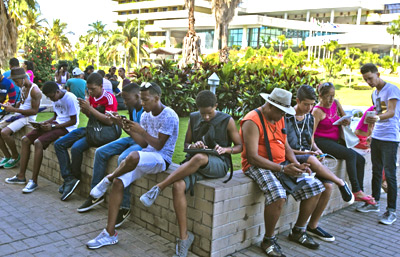

Cuba Practicalities – Electricity
220 and 110 volts can both be found and mixed but the most common in Cuba is 110 volts. The plugs can be flat or round. You should bring an adapter for the plug and ask which voltage applies.
Cuba Practicalities – Flights
Flights to La Havana are being added and discontinued all the time.
- From Spain contact OnlineTours.
- From Europe: Aireuropa, Airfrance, Iberia.
- From Mexico contact AlbisTours. Their Facebook page. WhatsApp: +529982991135 +529984841939. Email.
- From the US contact American Airlines, Delta, Southwest Airlines, jetBlue, United, Republic Airways or Mesa Airlines, all with non-stop flights.
- From Panama City check AVIANCA, Hahn Air Lines and COPA Airlines.
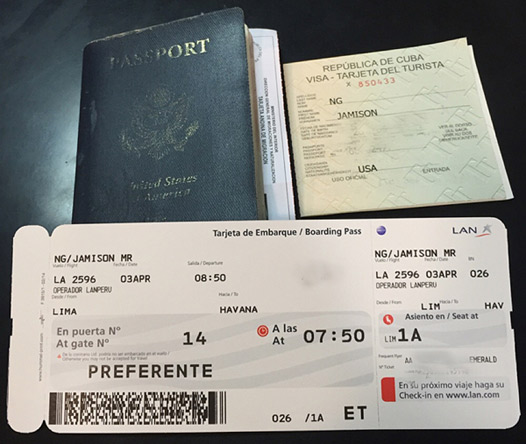
- Sunrise Airways connecting Dominican Republic, Haiti, Cuba, Panama, Turk and Caicos, Jamaica, San Martin, Porto Rico.
- Intercaribbean Airways operates an extensive network of flights between the Caribbean Islands, including flying to: Antigua, The Bahamas, The British Virgin Islands, Cuba, Dominica, Dominican Republic, Haiti, Jamaica, Puerto Rico, St. Lucia, Barbados, Grenada, St. Vincent and the Grenadines, and St. Maarten.
- Cubana Airlines from Paris, Madrid, Rome, Port au Prince, Santo Domingo, Toronto and Montreal once a week.
- Aerogaviota Airlines is a Cuban airline based in Havana, Cuba. The airline operates internal flights within Cuba as well as flights from Cuba to Kingston (Jamaica) 2 times a week.
- Sunwing Airlines from Toronto and Montreal once a week.
- Cayman Airways From Gran Cayman and other cities. They are very reliable and have flights twice a week to La Habana from Gran Cayman. Try to get a direct flight or one in the same day as accommodation on the island can be expensive.
- Jetcost Charter flights to La Habana
Tip: Calling may also be more efficient. Take note of the time of arrival and make it preferably during the day since airport transport is more expensive at night.
Cuba Practicalities: Insurance
You might be asked for your insurance at immigration and it is a requirement when you go to extend your visa, if you are staying longer than one month.
For online insurance go to the below link. You can change to English above right. It is the cheapest option we found and covers the requirements.
https://onlinetours.es/seguros-medicos-viaje-cuba
We recommend the second option, the 6000 USD coverage. It´s around 20 euros for a month but you need to put the start date, so buy it after you buy the ticket.
The insurance is payable online and goes directly to your email.
We also recommend ordering your visa online (see below) or you can ask your travel agent or the airline when you go to buy the ticket.
Cuba Practicalities – Visas
Steps for obtaining a visa in Cuba
Travelers from almost every country need a visa (technically called a “tourist card”) to travel to Cuba which is a loose card sold to you by filling out a form. It will not be stamped in your passport. While you can get a Cuba visa on arrival in Havana, most airlines won’t let you board unless you already have your visa in hand. So you will need to get a Cuban tourist card (visa), good for up to 30 days visiting Cuba. It is not especially expensive but costs more for people traveling from US airports. This is another visa (a pink one) for Americans flying to Cuba from American cities. It has a longer duration and is much more expensive. Also, it can be restricted to the categories listed by the American government as allowed for Americans visiting Cuba where tourism is not permitted.
To obtain the visa ask at the Cuban Consulate in your city or buy it online. This is an online visa issuing company for Cuba which will mail you the visa after you fill out the form and pay. Be sure to double check that the form information is exactly the same as on your passport.
We also recommend buying the travel insurance online (see above).
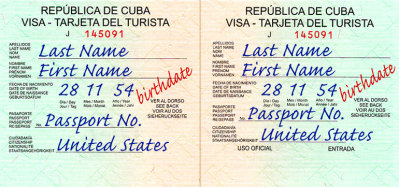
Every 30 days the visa can be renewed for up to 3 months at the Immigration Office nearest your residence in Cuba. The cost is around 25 USD and your coordinator will help you buy the stamps to do it at the bank.
Cuba practicalities – Money matters

The Cuban peso is abbreviated to CUP. If you want to change money to CUPs in the airport there is an official exchange bureau, CADECA but they charge a large commission and have a very bad exchange rate, so we recommend paying the taxi in USD and waiting to change money with your coordinator. If you are alone (without your coordinator), never exchange money in the street. Always go to a bank or CADECA; they are fairly handy. All participants should carry euros or dollars. As of June 21, 2021 official exchange of USD is being discontinued and only credit card payments in USD are accepted, however American banks´ credit cards do not work in Cuba. Bestprograms recommends bringing dollars or euros in cash and credit cards from non-US banks. The published exchange is 24 CUP = 1 USD, but if you change on the street a dollar can get up to double or even more!
Spending-wise, it is hard to calculate how much you will need because it depends on the exchange rate you get, but 500 euros/dollars a month (rent apart) is probably a good amount. There is really not much to buy but going out can cost the same as Europe or the US.
Cuba Practicalities – Food
Cuba is renowned for many exotic fruits and for its fresh market products. Products can be hard to come by so there may not be much variety. However, their cuisine can also be extremely creative and might surprise you considering the lack of resources.
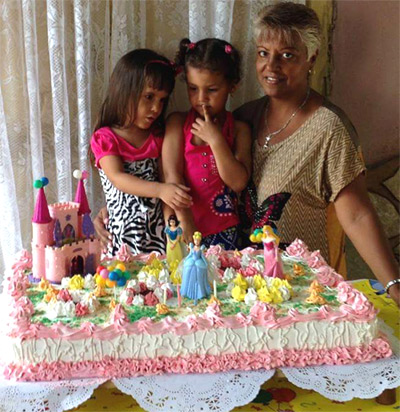
You will probably be okay if you don´t drink any water that is not bottled or boiled. Filtered water alone can be dangerous. Be careful with fresh products that might have been washed in tap water. Don´t forget this when brushing your teeth or ordering ice in drinks. Boiled water can taste funny, so if you want to make tea (like mint tea), that can help.
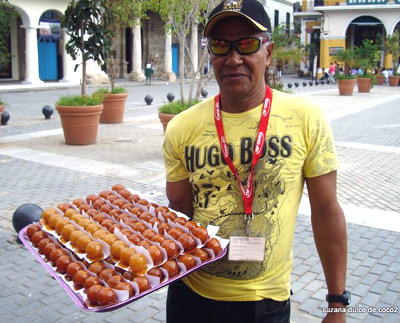
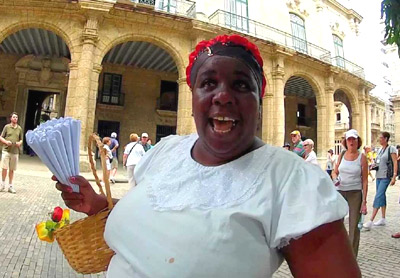
There is not much to snack on either. Once in a while an ice-cream or some peanuts, called mani, sold in conical paper and wrapped by hand. Private vendors carry trays of home-made sweets for sale too but it is not recommended eating them for hygenic reasons. Lots of sugar and coconut are common.
Below Enchilado de Camarones, a special meal served in a Cuban home.
Gifts
If you would like to take t-shirts, pens, trinkets, soap, toiletries, clothes, pendrives, nail polish, cosmetic items, school supplies, books, toys and other things you might not need but that are easy to carry, the Cubans will appreciate it a lot. Also, any used cell phone would be a great gift idea too.
Cuba Practicalities – Medications
We recommend being vaccinated for tetanus and hepatitis A. It is a good idea to bring a bug repellent and an antihistamine for bug bites. If you take any type of medication bring it because it is doubtful you can find it in Cuba; even aspirins are prescription drugs.
Cuba Practicalities – Hygiene
As we mentioned above never drink the tap water, even for brushing your teeth. We recommend buying 5 liter bottles of water at the supermarket or boiling the water and filtering it. The filtering takes away the funny flavor left from boiling water. As it is hot and humid, drink a lot. It is also a good idea to carry toilet paper or wipes because the public bathrooms might not be up to your standard. Because of poor pipes, it is not the custom to throw toilet paper in the toilet. You will see a bin next to the toilet for it. Soaps can be bought but It is also a good idea to bring your own soap for washing clothes, personal hygiene and hand-sanitizer. Before Covid it was not a custom to wash one´s hands a lot in Cuba but now the custom has changed for the better. We also recommend bringing face masks. A hat and an umbrella that can be used for rain or sun, are also useful.
Cuba Practicalities – Vaccines
Besides Covid, there are no mandatory vaccination requirements. Recommended vaccinations are: Tetanus, Hepatitis A. We are advised that there is no risk of malaria. Dengue fever is a known risk in some places. It is a tropical viral disease spread by daytime biting mosquitoes. There is currently no vaccine or prophylaxis available for Dengue, and therefore the best form of prevention is to avoid being bitten. We recommend you follow basic hygiene and take the usual precautions to avoid mosquito bites.
Health Requirements after Covid
Everyone has to complete a Health Declaration (with the address of where they will be staying).
Travel from La Havana to Santiago de Cuba and vice versa
- You might be able to buy an airline ticket with Cubana Aviacion from Europe or online. If you wait, there might not be any available once in Cuba.
- ViaAzul is 53 USD approximately payable in Cuban Pesos. It is by coach and is a public service for tourists. It takes approximately 14 hours.
- There is a private and more comfortable bus leaving from main hotel lobbies like the Hotel Habana Libre in La Havana. The tickets are 50 USD approximately payable in Cuban Pesos and include lunch. They can only be bought in person 3 days ahead of time.
- Travel between cities is also by private, shared taxis (called collectivos). Ask your coordinator for better information.
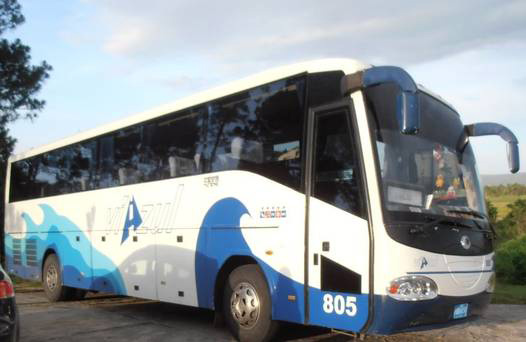
Note: There is a lot of air-conditioning on the bus, so bring a jacket.
Cuba Practicalities – Weather
Normally Cuba has humid but very good weather; in Santiago de Cuba it is hot or hotter, but in La Havana the spring is can get cool and rainy. Plastic sandals, shoes and bags are better than leather ones. Bring a hat and an umbrella. If you have to choose between them, take the umbrella which can be dubbed as a parasol if necessary.
Work Culture
The work culture in Cuba is totally different from any other country we have seen. It’s very important that our participants be aware that there are exceptional conditions in Cuba in every sense of the phrase: we work with organizations and firms where it is necessary to hold meetings in cafes, hotels, or in other public places because the offices have no air-conditioning and no Internet and sometimes power stoppages.

The Cubans are open to all creative solutions. We ask you to bring your computer because there aren’t usually any, or very old ones at best. If you want to help and succeed in Cuba, you need to adapt to the conditions and their open work culture which welcomes creativity and interchange.
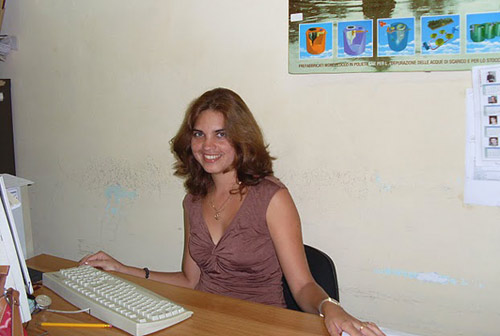
See our Work Culture in Cuba album in Facebook.

